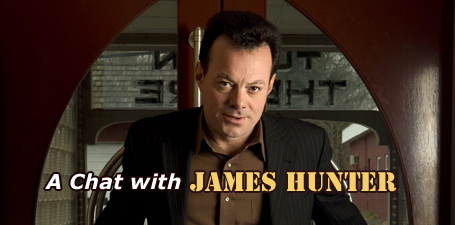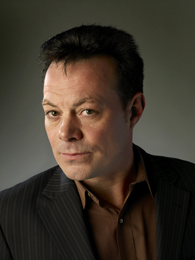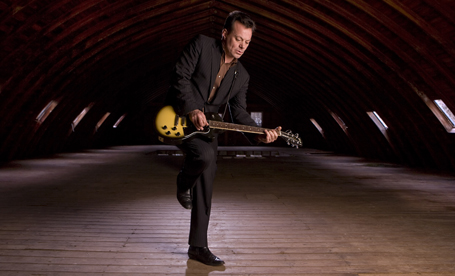 With the temperature dropping, it's time to find someone to keep you warm. Find your hookups with our online dating guide!
With the temperature dropping, it's time to find someone to keep you warm. Find your hookups with our online dating guide!

Interview date: 05/20/2008
Run date: 06/02/2008
Music Home / Entertainment Channel / Bullz-Eye Home
Funny how we're almost ashamed to call soul "soul" anymore. Amy Winehouse is considered what? Pop, we guess. Old Van Morrison records get played on classic rock stations. And self-taught English soul crooner – and we mean true vintage '60s Sam Cooke soul, not the compressed, remixed, triple-overdubbed, homogenized and watered-down 2008 flavor – James Hunter's a definite soul phenomenon, and nothing else. Yet his 2006 album People Gonna Talk went from indie obscurity to a Grammy nomination for best traditional blues album – in an amazing group that included Duke Robillard, Dion DiMucci, Tab Benoit, and Ike Turner, who took the trophy for Risin' with the Blues. It wasn't his first album; his 1996 Ace Records debut, Believe What I Say, featured two duets with Van Morrison, a mentor who's extolled Hunter’s virtues from time to time. Hunter's back June 10 with a new record, The Hard Way, which will be sold in Starbucks on the Go Records/Hear Music imprints. It features New Orleans R&B great Allen Toussaint on keys as well as Hunter’s working band, loaded with tenor and bari sax and the mandatory soul organ. He'll tour this summer with the likes of Toussaint and Willie Nelson. It's a far cry from his days in his hometown of Colchester as a failed signal maintenance trainee for the British Rail in the late 1970s.
Bullz-Eye caught up with the charmingly self-deprecating Hunter on a transatlantic call May 20 and 22, as he geared up for the release of the new record.
Bullz-Eye: How does an Englishman get into soul music so much that he decides to make a go at singing it for a living?
 James Hunter: It's a freak thing, really. There are varied accounts of how it happened, one of which is that I had a colleague on the railway who would keep me informed of the latest reissues and releases. So there were a few kindred spirits in Colchester. And probably because there's not much else to do there. If you've heard the indigenous English music, that will give you a clue as to how I gravitated to the American stuff.
James Hunter: It's a freak thing, really. There are varied accounts of how it happened, one of which is that I had a colleague on the railway who would keep me informed of the latest reissues and releases. So there were a few kindred spirits in Colchester. And probably because there's not much else to do there. If you've heard the indigenous English music, that will give you a clue as to how I gravitated to the American stuff.
BE: At what point did you realize you weren't just a fan and decided it was your life's calling?
JH: It went hand in hand with realizing, essentially, I was unemployable by any other standards (laughs). I think it was my first couple of years on the railway – it was a process of elimination; part of it was that I wanted to avoid gainful employment. I think that's what it was. Apart from trying to avoid work...I also think it was when I first started busking – playing outdoors – in London. I think it was when we started to get invited indoors to play...
BE: ...that you realized you had something...
JH: ...apart from rabies!
BE: Tell me why you think this real retro '60s soul is making a comeback on the pop charts?
JH: It's the usual thing – what looks like a movement is a succession of coincidences. A whole bunch of us seemed to have latched on to a particular style at the same time. It's usually something that comes along – like a movement – usually starts when [pop] music seems to lose its way, they don't know what direction to take.
BE: You can definitely say that about a lot of the pop music on the charts right now.
JH: Some of it sounds a bit wayward, doesn't it? To some degree or another, pop stars have been manufactured. But it's slightly more extreme or overt. Part of the process of making them who they are is actually part of the entertainment. They all seem have won competitions on TV programs.
BE: Of the flavors of old American soul – Memphis, Motown, Muscle Shoals – what's your favorite?
JH: Off the top of my head, the very, very early Motown, before it was barely called that, when it was all baritone sax, flute, and tambourine. Early Marv Johnson sides and the sort of stuff Jackie Wilson was doing.
BE: Yeah, I noticed you had [Motown bassist extraordinaire] James Jamerson as one of your top MySpace friends.
JH: (Laughs) I don't think I have many people who are alive on there, have I!
BE: You mentioned Jackie Wilson. Who are your favorite soul singers – the ones who influenced you the most?
JH: Wilson, definitely. The attraction of his stuff...he shows that music can be a lot of pyrotechnic showing-off and still be completely valid. There are so many different levels you can appreciate different artists that are ostensibly in the same realm: Little Willie John for his passion, Jackie Wilson for his pyrotechnics. For the whole package, my favorite is a group, the 5 Royales. Some of their songs were more famously recorded by other people, like "Think" – the James Brown one, not the Aretha Franklin one – and "Dedicated to the One I Love," by the Shirelles, that was one of theirs. Some of their songs are more famous than they are.

BE: Some writers have compared you to Sam Cooke. How does that make you feel?
JH: I regard it as ludicrous flattery – but I can't object to it. You can't really kick up about it. I know there's a certain similarity in the sound, but on many levels I couldn't even to begin to approach what he did. So I just take it for the compliment that is. I'm just glad he's not [around] to be offended by it. Not that I'm glad he's not alive, but if there's an upside, he doesn't have to be compared to this English twit from Colchester.
BE: Tell me a little about the new record.
JH: The recording was a bit more exciting, because Liam [Watson] – this bloke from Toe Rag Studios – stripped his equipment down even further from what he already had the previous time, and used even fewer tracks to record us. In fact, the whole band – except for vocals and guitar – he had on one single track.
BE: That's unbelievable.
JH: It is unbelievable. We didn't believe it ourselves. He claims it produces a slightly better quality recording. I don't believe him. I think the reason he did that is because he hates mixing and he wants to get the mixing process over before we've recorded the thing. So he's getting the mixing done while we're running through it. The upside for us is that [there's] less we have to do with it afterwards.
BE: Is that how you get the vintage sound? Are you using vintage gear or how do you make it sound so retro?
JH: I think it might be the way I write, I think it's a particular favorite style of mine, the kind of directness, the earthiness of some of that old stuff. Whenever I try to write, it tends to come out that way. If it can be said to work, it's because we approach it like it's real music, not that over-reverent feeling toward it that stops us from doing it as if it's real. From my point of view, all I'm doing is writing pop songs. What determines whether it's pop music is whether or not grownup people buy it.
BE: You did get some traction in the world of popular music with the last record. How did it feel when you got nominated for a Grammy?
JH: I was staggered, actually. I was only dimly aware of what the Grammys were, only that it was a fairly big deal, really. I was quite surprised. Our manager had that in mind from the start, that was a particular target of hers, to be nominated and win one. It wasn't particularly galling to lose to Ike Turner – because if there was no Ike Turner I'd probably never be doing what I'm doing.
BE: Did you end up going to the ceremonies?
JH: We did. And I met Dion! He was nominated in the same category as me and Ike and Duke Robillard. Our manager spotted Dion and dragged me over to say hello to him. He's somebody who's a bit of a musical icon for me. It was great meeting him, especially when he said he thought I was going to win.
BE: I've seen him live – he's all right.
JH: I think he's doing a bluesy style now, but I said I'd always be completely enamored of the stuff he probably doesn't want to talk about anymore. If there's one bunch of people who could do doo-wop approaching the way the black guys could do it, it's the Italians!
BE: Oh, for a second there I thought you meant his Christian folk phase, which he doesn't talk about anymore, either.
JH: Oh really? I did not know that! I was talking about his doo wop, I didn't know he'd gone God-ded up.
BE: How'd you fall into touring with Willie Nelson a little this summer?
JH: No idea; I think we got foisted upon him (laughs), our managers and agents thought it'd be a good idea. I wasn't even sure they were expecting us when I got there, but once they got resigned to the fact that we'd be hanging on their coattails they were very nice about it.
BE: Anything else you'd like to say to the readers of Bullz-Eye who are discovering you by reading this interview?
JH: I'd like to apologize in advance. Humbly and sincerely, for what you're about to hear.
BE: You've got nothing to apologize for. The album's excellent, and I wish you the very best.
JH: Thank you very much.
You can follow us on Twitter and Facebook for content updates. Also, sign up for our email list for weekly updates and check us out on Google+ as well.










